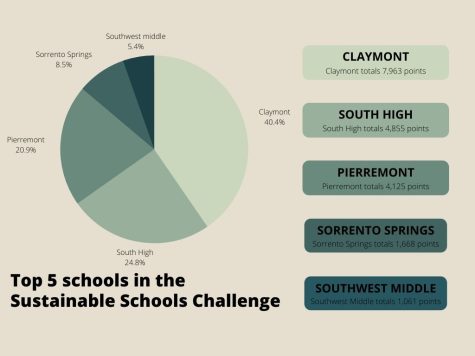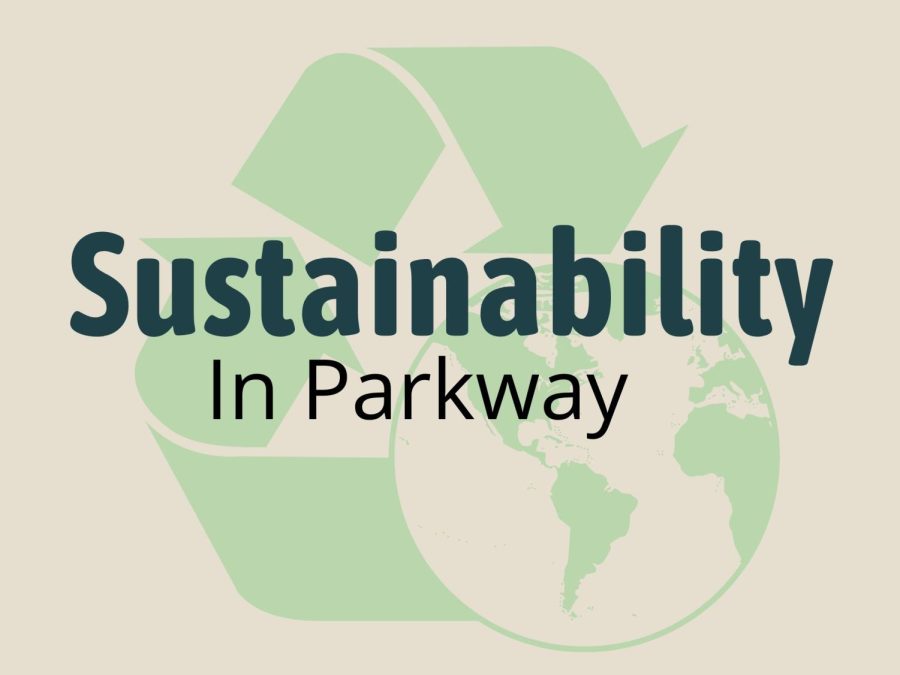Sustainability in Parkway
March 30, 2022
The world produces 400 million tons of plastic each year, while nine out of 10 people worldwide are breathing polluted air. As the climate changes, it grows more and more important for students and staff alike to have an environmental-based mindset. However, a lack of environmental awareness persists within Parkway as individual schools do not equally implement sustainable practices.
Project Parkway’s Strategic Plan of achieving “capable, curious, caring and confident learners who understand and respond to the challenges of an ever-changing world” can not be accomplished without the work of every member of the staff and student body within schools.
One measurable objective within the Strategic Plan includes the idea that “each school, department and program will successfully integrate environmentally, socially and fiscally sustainable best practices into their area of focus.” Part of being able to respond to the challenges of an ever-changing world includes using sustainable practices within schools. It is our responsibility as members of Parkway to work to implement these practices.
Parkway has found success in water conservation and reducing greenhouse gas emissions. The district aimed at reducing greenhouse gas emissions by 35% and has seen a decrease of 20,944 tons of carbon dioxide in the 10 year period between 2010 and 2020 through Energy Star appliances.
Twenty-two schools within the Parkway School District are Energy Star certified buildings as of 2020, and in 2021, Parkway was named an Energy Star partner of the year. However, while district-centered attempts at improving sustainability have proven worthwhile, there remains a wide disparity between each Parkway school’s sustainability practices when it comes to individual schools, particularly in the process of diverting landfill waste.
Waste diversion and reduction
Parkway’s attempts at diverting landfill waste remain futile. Between 2018 and 2019, the trash produced each month stood consistently above 130 tons. While Parkway managed to divert around 50% of all waste from the landfill, little progress has been made recently in moving that percentage towards the 70% goal. When it comes to diverting landfill waste, a practice largely dependent on how each school responds, Parkway falls short.
Over the last school year, West High led in the trash and composting at 158,976 pounds. North High, however, only produced 52,992 pounds of trash and composting last year. There is over a 100,000-pound difference in these two schools’ waste and composting even though there is only a 142 person difference in the two schools’ student populations.
Despite a similar staff and student body size, these two schools have vastly different consumption levels. Therefore, the issue of landfill waste diversion is dependent on how each school implements trash, recycling and composting practices.
The issue of landfill diversion and waste reduction has become more challenging in recent years. COVID-19 has led to supply and staff shortages that have impacted every level of the waste reduction process. For example, Chartwells, which in past years had provided schools with compostable trays, has struggled to provide these trays due to supply shortages, compostable cutlery has been replaced with wrapped single-use plastic cutlery and plans at switching from paper towel dispensers to energy-efficient hand dryers were halted during the beginning of COVID-19.
Parkway has attempted to counteract the pressures COVID-19 created on a waste diversion by creating an additional 116 new waste sorting stations, but the challenges faced in landfill diversion and waste reduction have led to little change. A return to compostable cutlery and a switch to reusable trays would help reduce this waste. Though it may cost more money to get the dishwashing supplies and staff necessary to make this change, it would benefit schools in the long run by reducing the amount of waste produced.
It is the responsibility of each school and individuals within schools to work on decreasing their waste production. The accumulation of waste isn’t something that the district can control, but it is something that we as individuals can work to reduce. Schools need to promote recycling and composting, encourage students to bring reusable containers during lunch, and, through the Sustainability Department’s help, perform waste audits to create an action plan towards reducing waste consumption.
Sustainable Schools Challenge
One way that Parkway has attempted to implement sustainability into individual schools is through the Sustainable Schools Challenge. The Sustainable Schools challenge was to get students and staff involved in individual actions towards sustainability. The Sustainable Schools Challenge involves a point system that schools can get involved in for the chance of winning $50 a month and $600 at the end of the school year. Opportunities to earn these points include hosting a tree planting day, calculating your carbon footprint and becoming a Recycle Rally school, among other possibilities.
Despite implementing this challenge, a wide point disparity exists between schools within the Parkway School District. For example, Claymont has achieved the most significant sustainability points at 7,963 points, while schools like Fern Ridge have not earned a single point towards sustainability.

Both individual students and schools have the opportunity to apply for a mini-grant if they wish to start a project that aligns with Parkways sustainability goals. Each grant is worth $400, and requests are reviewed four times a year on a rolling deadline. The last two deadlines, however, have not had any grant applications.
Parkway’s attempts at promoting sustainability within individual schools have faltered, with no schools taking advantage of the resources offered. It is not enough to have funds for projects if schools never choose to take advantage of them.
The Principles of Education for Sustainability in Parkway states that “all students need knowledge, skills and understanding of sustainability to positively respond to an ever-changing world.” Parkway claims to aim towards working with students to grow environmentally conscious mindsets and provide the resources they need to work towards sustainability. Yet, very little sustainability is taught and practiced within schools.
While high school students can sign up for classes about the environment, not every school within Parkway offers the same courses to their students. Therefore, taking classes based on the environment is not a guarantee, and many students never learn this information.
Without the equal implementation of environmentally friendly practices and education on these practices, a wide disparity will exist between schools within Parkway. In addition, all students cannot gain the knowledge, skills and understanding of sustainability that they need when the practices outlined in the Sustainable Schools Challenge are optional within schools.
Addressing Sustainability
The Sustainability Leaders Program is one method that Parkway hopes to address sustainability. This program would include a staff sustainability leader appointed for each school, where each school’s sustainability leader would work together to implement sustainability initiatives throughout the district. Hannah Carter, Parkways Sustainability Coordinator, hopes that this program will increase the use of sustainable practices throughout the district.
“I think that [the Sustainability Leaders Program] will create a great pathway of communication for people to share what they’re doing, but also inspire schools who haven’t necessarily participated in the past or haven’t felt that they have that support to kind of build those support networks,” Carter said.
Parkway must work to implement sustainable practices and education on environmental issues into early childhood and elementary schools. While sustainable practices should be taught and practiced within every Parkway school, the ability of children to grow mentally as a result of their environment is at its peak during the early stages of childhood.
When schools begin teaching sustainability principles during early childhood, they nurture the possibility of these principles sticking with the child throughout their lives. The Sustainable Schools Challenge highlights means of teaching these principles, but since the guidelines are suggestions rather than requirements within schools, schools do not teach these principles equally to students.
Parkway should reshape the Sustainable Schools Challenge. Rather than making it a competition, Parkway should require schools to participate in a certain number of activities. Parkway has shown that they are successful in sustainability practices at a district level. However, the issue with Parkways sustainability remains in how each school implements those procedures. Making these practices a requirement would allow students to gain more equal knowledge and experience on sustainable practices than if implemented by individual schools.
We as a community can work to solve the sustainability issue by voting on the upcoming bond issue. The bond issue includes upgrading HVAC controls, implementing LED lighting and adding water submeters, among other building improvements. The Sustainability Department plans to work with Facilities to determine what will be included on the bond issue and how these projects can be made sustainable.
There are many ways Parkway has attempted to implement sustainable practices throughout the district but is it not enough to rely on district initiatives. Each individual school needs to find ways to reduce their waste production and work on sustainable projects. Students and staff can work together on sustainability by promoting the bond issue and projects within the Sustainable Schools Challenge and teaching a sustainable mindset. In addition, students and staff could work together with other schools across the district to discuss how each school has worked toward sustainability and how these practices can be improved. While the district has worked on sustainability initiatives, the next step in addressing sustainability is getting each school involved.

